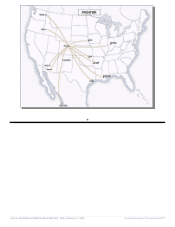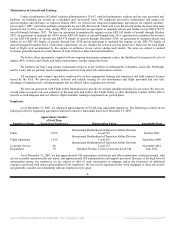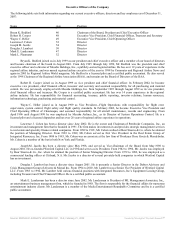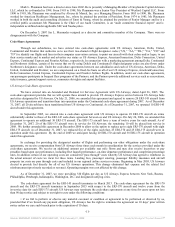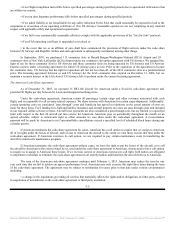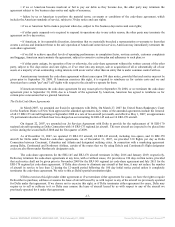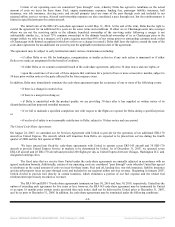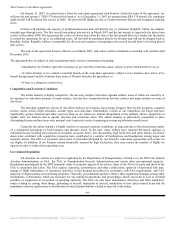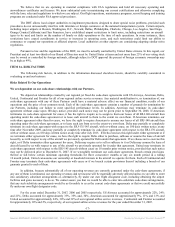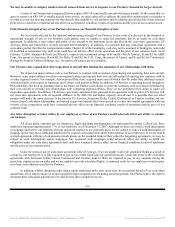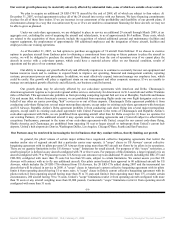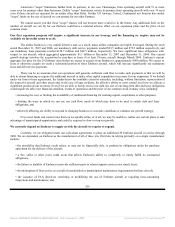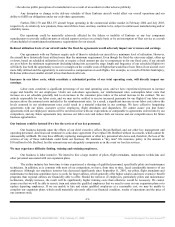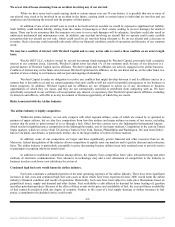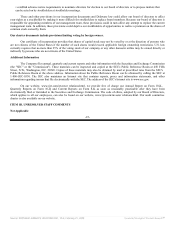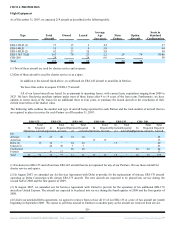Frontier Airlines 2007 Annual Report Download - page 23
Download and view the complete annual report
Please find page 23 of the 2007 Frontier Airlines annual report below. You can navigate through the pages in the report by either clicking on the pages listed below, or by using the keyword search tool below to find specific information within the annual report.
We believe that we are operating in material compliance with FAA regulations and hold all necessary operating and
airworthiness certificates and licenses. We incur substantial costs in maintaining our current certifications and otherwise complying
with the laws, rules and regulations to which we are subject. Our flight operations, maintenance programs, record keeping and training
programs are conducted under FAA approved procedures.
The DOT allows local airport authorities to implement procedures designed to abate special noise problems, provided such
procedures do not unreasonably interfere with interstate or foreign commerce or the national transportation system. Certain airports,
including major airports at Boston, Washington, D.C., Newark, Dallas, Philadelphia, Charlotte, Chicago, Los Angeles, San Diego,
Orange County(California) and San Francisco, have established airport restrictions to limit noise, including restrictions on aircraft
types to be used and limits on the number of hourly or daily operations or the time of such operations. In some instances, these
restrictions have caused curtailments in service or increases in operating costs, and such restrictions could limit our ability to
commence or expand our operations at affected airports. Local authorities at other airports are considering adopting similar noise
regulations.
Pursuant to law and the regulations of the DOT, we must be actually controlled by United States citizens. In this regard, our
President and at least two-thirds of our Board of Directors must be United States citizens and not more than 25% of our voting stock
may be owned or controlled by foreign nationals, although subject to DOT approval the percent of foreign economic ownership may
be as high as 49%.
ITEM 1A. RISK FACTORS
The following risk factors, in addition to the information discussed elsewhere herein, should be carefully considered in
evaluating us and our business:
Risks Related To Our Operations
We are dependent on our code-share relationships with our Partners.
We depend on relationships created by our regional jet fixed-fee code-share agreements with US Airways, American, Delta,
United, Continental and Frontier for all of our regional airline service revenues. Any material modification to, or termination of, our
code-share agreements with any of these Partners could have a material adverse effect on our financial condition, results of our
operations and the price of our common stock. Each of the code-share agreements contains a number of grounds for termination by
our Partners, including our failure to meet specified performance levels. In addition, American may terminate its code-share
agreement without cause upon 180 days notice, provided such notice may not be given prior to September 30, 2008. If American
terminates its code-share agreement for cause, it has the right to require us to assign to them our leases of all ERJ-140 aircraft then
operating under the code-share agreement or to lease such aircraft to them to the extent we own them. If American terminates our
code-share agreement other than for cause, we have the right to require American to assume our leases of all ERJ-140 aircraft then
operating under the code-share agreement, or to lease such jets from us to the extent we own them. Delta may partially or completely
terminate its code-share agreement with respect to the ERJ-135/145 aircraft, with or without cause, on 180 days written notice at any
time after November 2009, and may partially or completely terminate its code-share agreement with respect to the ERJ-170 aircraft,
with or without cause, on 180 days written notice at any time after July 2015. If Delta exercises this right under either agreement or if
we terminate either agreement for cause, we have the right to require Delta either to purchase, sublease or assume the lease of aircraft
leased by us with respect to any of the aircraft we previously operated for Delta under that agreement. If we choose not to exercise this
right, or if Delta terminates either agreement for cause, Delta may require us to sell or sublease to it or Delta may assume the lease of
aircraft leased by us with respect to any of the aircraft we previously operated for it under that agreement. United may terminate its
code-share agreement with respect to the ERJ-145 aircraft without cause on 18 months prior written notice, provided that such notice
may not be delivered prior to December 31, 2007. If we wrongfully terminate our code-share agreement, breach certain provisions
thereof or fall below certain minimum operating thresholds for three consecutive months or any six month period in a rolling
12 month period, United can assume our ownership or leasehold interests in the aircraft we operate for them. Each of Continental and
Frontier may terminate their code-share agreements with cause or if we breach certain provisions thereof including a breach of our
guaranty granted to each of them.
In addition, because substantially all of our operating revenues are currently generated under the code-share agreements, if
any one of them is terminated, our operating revenues and net income will be materially adversely affected unless we are able to enter
into satisfactory substitute arrangements or, alternatively, fly under our own flight designator code, including obtaining the airport
facilities and gates necessary to do so. We cannot assure you that we would be able to enter into substitute code-share arrangements,
that any such substitute arrangements would be as favorable to us as the current code-share agreements or that we could successfully
fly under our own flight designator code.
For the years ended December 31, 2007, 2006 and 2005 respectively, US Airways accounted for approximately 22%, 24%
and 21%, Delta accounted for approximately 33%, 35% and, 34%, American accounted for approximately 9%, 11% and 13% and
United accounted for approximately 24%, 30% and 32% of our regional airline service revenues. Continental and Frontier accounted
for approximately 10% and 2%, respectively, of our regional airline service revenues for the year ended December 31, 2007.
-17-
Source: REPUBLIC AIRWAYS HOLDINGS INC, 10-K, February 21, 2008 Powered by Morningstar® Document Research℠


